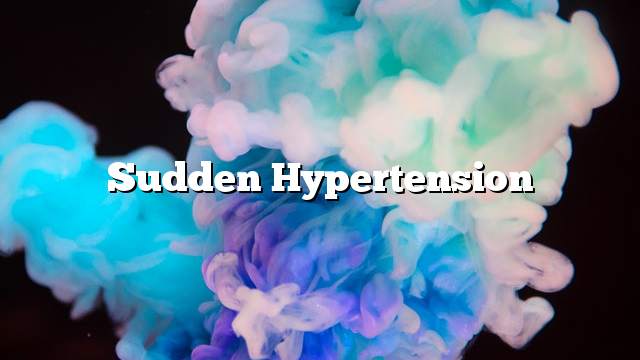Hypertension
Is a major risk factor for the development of heart disease and stroke. Our blood pressure fluctuates constantly and you may find differences in blood pressure even if it is taken a 5 minute difference between them, there are many factors that can affect your blood pressure to change every day. Sudden high blood pressure can also be associated with your mental state, along with any physical cause, which may also depend on time, either day or night
If your blood pressure remains within normal limits throughout your life, and a sudden rise in blood pressure may come to normal in many cases, before prescribing a high blood pressure patient, your doctor may take several blood pressure readings after the initial examination. If sudden hypertension persists for longer than a week or two, you may need medical treatment.
Symptoms of sudden rise in blood pressure
Sudden rise in blood pressure can become an emergency for high blood pressure. Urgent reduction of blood pressure in the hospital may be prevented to prevent acute heart attacks, as well as a neurological crisis, however longer blood pressure may cause progressive damage to the body’s vital organs.
High blood pressure is detected largely during a routine examination, when there is a sudden and unexpected rise of blood pressure, it may be associated with symptoms such as:
- Bleeding from the nose suddenly without any reason in a person who has no previous history of nasal bleeding
- Early morning headache (head weight at the base of the skull)
- Dizziness
- Fatigue
- Chest compression and palpitations
- Blurred vision
- A small stroke may occur in the brain
- There may be transient ischemic attacks
- Sudden high blood pressure can lead to bleeding in the brain
- Nausea and vomiting
What causes sudden hypertension
- Medications: Many medications can cause an increase in blood pressure, some of these pills such as taken on a regular basis can lead to chronic hypertension, however, some over-the-counter medications that are used only occasionally can cause a sudden increase in blood pressure . For example, analgesics and anti-inflammatory drugs, such as aspirin and ibuprofen (Advil, Motrin), can suddenly raise blood pressure.
- Salt consumption: Consuming salty foods or drinks can cause a sudden increase in blood pressure because sodium pushes the body to retain more elasticity. This rise in blood pressure usually takes a short period of time.
- Smoking: When you smoke inhaled nicotine, which has a direct effect on blood pressure. Nicotine causes changes in the functioning of blood vessels and produces inflammation within the circulatory system, which contributes to arteriosclerosis and high blood pressure. These changes begin after smoking only one cigarette, according to a 2007 report in the American Journal of Hypertension,
- Stress: Is another cause of sudden hypertension. When a person struggles, the body releases stress hormones, these hormones work on the heart and blood vessels to contract, causing high blood pressure and heart palpitation
- the pain : Sudden pain that is due especially to accidents can raise sudden blood pressure.
- other reasons : High blood pressure can be caused by some diseases, including:
- Kidney problems
- Adrenal gland tumors
- Thyroid problems
- Some defects in blood vessels
- Sleep Apnea
How To Treat Sudden Hypertension
- High blood pressure in the hospital should be treated with blood pressure control
- Intravenous intravenous injection therapy is administered to make blood pressure less naturally. The doctor will look for the cause of this rise in blood pressure and will also look for particular consequences on the brain
- In the case of acute lung edema, intravenous diuretic therapy is prescribed
Studies and research
An American study has shown that weight gain is a major cause of sudden high blood pressure. It is estimated that 70 percent of men’s hypertension and 60 percent of high blood pressure in women are due to obesity, especially abdominal obesity.
